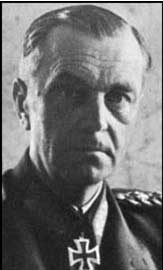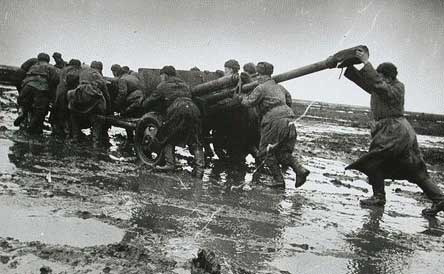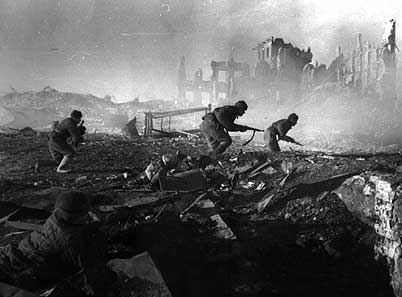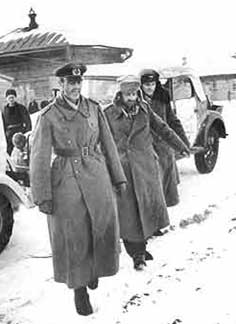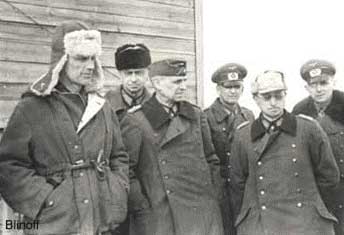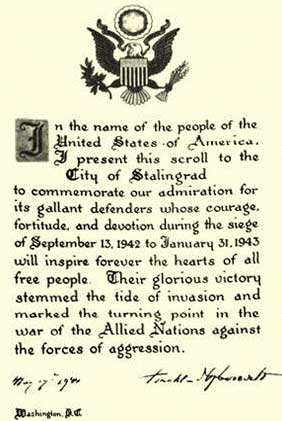|
Field Marshal Friedrich Wilhelm Ernst Paulus ( 1890- 1957 )
Friedrich Paulus was born in the parish of Brieitemnau-Gershagen on September 23rd. 1890. His father a Civil Service bookkeeper, thus the future Field Marshal was no blue blood born with a silver spoon in his mouth. He graduated from Wilhelms-Gymnasium at Kassel in 1909 to be refused a Navy Officer place through lack of an aristocratic blood line, he turned to study law but briefly at the University of Munich. Now he tried the Army, joining the 111th. 3rd. Baden Infantry Regiment as an Officer-Cadet on February 18th. 1910, to be commissioned as a Second Lieutenant 20 months later.
As a Lieutenant in 1912, he married a 21 year old Rumanian aristocrat, Elena " Coca " Rosetti-Solescu, reportedly a beautiful, graceful but strong - willed woman, always ambitious for her husband. They had three children, a girl Olga in 1914, and twin boys, Friedrich and Alexander in 1918. Both were made Captains in Hitler's Army, with Friedrich killed at Anzio, and his brother wounded at Stalingrad, and after his father worked with the Russians in 1944, Alexander was arrested by the Nazis and placed in a detention camp until the war ended. But I am getting ahead of the story here. WW1. He was now selected as one of the 4,000 Officer Corps allowed by the Treaty of Versailles, and became adjutant of the 14th. Infantry Regiment at Konstanz. He carried out General Staff training in Berlin to be a General Staff Officer in Stuttgart over 1924-1927 with Wehrkreis V. Over the twenties his efficiency reports indicated he was at pains to avoid making enemies, he was slow but methodical, he was apt to work all night using both coffee and cigarettes to support him, not a good trait for a future Field Marshal. Promotion. He made it to Colonel on June 1st. 1935 and chief of staff to General Oswald Lutz, the boss of Mechanized Forces in Berlin. He began to make a name for himself as an expert on motorized warfare attracting the attention of General Walter von Reichenau Chief of the Armed Forces Office in the Ministry of War, he too was an advocate of armoured warfare. Another promotion. He was the complete foil to his dashing energetic commander, the slow but methodical staff officer following up on the paper trail diligently,a good combination. They were together in Poland, Belgium and France, 10th. Army now named 6th. Army. In September 1940, Paulus was rewarded with a promotion to Lieutenant General, now responsible for all Army training and organisation. He conducted a strategic survey for the invasion of the Soviet Union, indicating to win against the Russians Germany must not allow the Soviet forces to retreat into the interior. The campaign needed to be concluded by late October when the rainy season was due to begin. Russian Campaign. Now no doubt Reichenau intended to look after his former Chief of Staff, but he unfortunately suffered a heart attack and died on January 17th. 1942, to be replaced by the not so accommodating Fedor von Bock. High Command. Paulus fought his battle against Timoshenko's advance on the Dneiper, and halted the Russian winter offensive in the southern sector. By February 10th. 1942 both sides were utterly exhausted, and the Soviet salient at Izyum being sealed off from the west, it became a race to resupply, with a marked advantage going to the first to attack in the coming spring. The Russians are Coming. The intervention of Group Kleist saved 6th. Army from extinction, linking up with Kleist west of Karkov they encircled the main Soviet force to capture 240,00 men, 2,026 tanks and 1,249 guns. Paulus was awarded the Knight's Cross for his part in this victory, he had been lucky to have Kleist to bail him out. In the summer of 1942, Paulus and his 6th. Army moved east with 20 divisions towards Stalingrad, but the advance was slow, Hitler had given the bulk of fuel available to Army Group South and their move to the Caucas arena. Stalingrad may well have been taken without much of a fight by the end of July, but Paulus was out of fuel 150 miles west of Kalach to be halted until August 7th. He then attacked two Soviet armies west of the Don , by the 11th. 50,000 Soviet troops were either captured or killed along with a vast amount of tanks and armoured vehicles. Within another week Stalingrad was but 35 miles distant, but again no fuel available for the final push, after five more days he advanced with a single corps, von Wietershem's XIV Panzer, who found themselves at the end of a narrow two mile corridor that was 30 miles long. The Soviets attacked the length of this corridor, and from troops on Paulus's left flank, he could not spare any infantry to secure this corridor until after Hoth's 4th. Panzer Army coming onto Stalingrad from the south had freed up his right flank. The Battle for Stalingrad.
Weichs wanted to attack at once before Stalin could reinforce his forces within the city but Paulus was held up by Soviet counter attacks on his northern flank, and did not launch his move on Stalingrad. This hesitation later was to cost him and his troops dearly, and perhaps even victory, as Stalin used this pause to push in thousands of reinforcements. Paulus was not one to take risks, and he paid the price for his timidity. The Germans move on Stalingrad at last. Another period passed before the Volga River was reached to cut the Soviet Sixty Second Army in two on September 20th. Further south, General Kempf's XL III Panzer Corps from the 4th. Panzer Army joined in the fight on September 10th. to link up with Seydlitz's LI Corps, now Paulus used XLVIII Panzers to clear the southern half of Stalingrad, a task totally unsuitable for a mobile Panzer group, it was a job for the foot soldier grunts, and casualties were high, the job done by September 26th. A swastika flag flew proudly over Soviet government buildings on Red Square. But by no means was the battle finally over. Stalingrad, a battle fought in rubble. 6th.Army had to clear out each of these strongholds one by one, few prisoners were taken by either side, and the Germans called it Rattenkreik: A War of the Rats. Hitler had put his reputation on the line that Stalingrad would fall to his forces, but with Army Group A in the vicinity of the Caucasus, there were not sufficient German troops to really cover Paulus's flanks. 6th. Army stood at the top of a large bulge from the Don to the Volga, Roumanians, Italians, and Hungarians covered its sides, the fighting ability of these foreign troops was questionable at any time, let alone to stand fast against heavy Russian attacks. Dissention in the German Command. The battle raged on, no doubt Stalin quite pleased that Hitler had allowed his forces to be sucked into a fight of attrition within a fortified urban area, where all advantages were with the defenders. Stalin threw in another nine infantry divisions two tank brigades and a rifle brigade, as the 6th. Army was bleeding to death. Since crossing the Don Paulus had lost 40,000 men mostly from his infantry, his use of ammunition amazing, 25 million rounds of small arms ammunition, 500,000 anti tank shells, and 750,000 artillery projectiles, mostly to no avail. Battle for Stalingrad extended beyond the city limits. The Commander of the 4th. Air Fleet, Baron Wolfram von Richtofen was critical of the way Paulus was handling this Stalingrad battle calling for his replacement, but nothing eventuated. By the first week into November Paulus had 90% of the city or what was left of it in his hands, but he was almost out of ammunition, and had probably shot his bolt. Stalin threw in more troops, Paulus attacked again on November 10th, using four newly arrived engineer battalions, one broke through, but soon they were all cut to pieces within 48 hours, the last offensive by Paulus had failed. Russian offensive against the Rumanians. On November 21st. the Red Armies in the north swung 90 degrees, close to the rear of the German 6th. Army, and were soon in sight of Paulus's command post at Golubinsky. General Paulus and his staff hurried southwards to establish a new CP at Gumrak Airfield. Hitler orders 6th. Army to stay put. Soviet Armies close the net.
Now Paulus met with his Chief of Staff and some of his generals and Luftwaffe Major General Wolfgang Pickert, who was informed that the 6th. Army had insufficient fuel to break out of Stalingrad, and the Luftwaffe would have to supply the force by air, but Pickert argued that a breakout to the south west should immediately be tried as his airforce could not resupply on such a massive scale in a Russian winter. Of course the time to make an attempt at a breakout is immediately after an encirclement is achieved, and before the enemy has time to consolidate his positions. Paulus's generals were urging him to defy Hitler's orders to stay put and order a breakout, but it was not in his nature to be either take a chance, or go against his beloved Fuerher's orders, and he did nothing. His Chief of Staff decided to bypass his boss and appealed to the Commander of Group Army B, Baron Maximilian von Weichs to order a breakout on his own initiative, but he remained unmoved. Stalingrad Airlift fails. Parlous state of the German troops. Tens of thousands suffered frost bite, and thousands more just froze to death, the Russian winter surely on the Soviet side. Field Marshal Manstein to the rescue. Now he called on Paulus to break out, and even Hitler was moved to give his provisional approval, but Paulus saying he only had enough fuel to travel 18 miles refused to budge. Manstein sent off a Major to try and get Paulus off his behind, but without avail. By Christmas of 1942, 28,000 German troops had died at Stalingrad, the army strength was 246,000 which included 13,000 Rumanians and 19,300 Russian Auxiliaries, as the temperature now fell to minus 5 degrees Fahrenheit. Now on December 27th. the relief column was forced to withdraw as they were in danger of being encircled. Demand to surrender rejected. Gaps appeared in the front and Paulus was unable to close them, he was down to less than 100 tanks, and fuel and ammunition were almost exhausted. The last airfield at Gumrack was lost on January 22nd, and the Russians broke through the western perimeter the next day, isolating XI Corps in the north. 12,000 unattended wounded lay in the streets, Paulus ordered that the wounded be no longer fed, if you could not fight, you did not eat. By the 25th. of January 20,000 wounded lay in the streets. Now more disaster, the southern pocket was cut in half on January 28th. two days later Paulus signalled Hitler: " On the anniversary of your assumption of power, the 6th. Army sends greetings to the Fuehrer. The swastika still flutters over Stalingrad. May our struggle stand as an example to generations yet unborn never to surrender, no matter how desperate the odds. Then Germany will be victorious. Heil, Mein Fuehrer." Paulus promoted to Field Marshal on January 30th. 1943. The Russians hammering on the door. Paulus surrenders.
The Battle for Stalingrad at last over. Of the 274,000 encircled on November 22nd, 91,000 surrendered, some 25,000 German sick and wounded having been flown out, thus about 150,000 Germans were killed or had died in the Stalingrad seige. This was a disaster of major proportions. The Russians who never made public their casuality figures also suffered enormous losses. 6th. Army death march to Siberia. Paulus a Russian propagandist. His family back home were all arrested on Hitler's orders under the prevailing doctrine of collective family responsibility. Paulus appeared at the Nuremberg Trials in 1946 as a witness for the Russian prosecution. In 1949 his wife had died, and the Field Marshal was not released from prison until 1953, when he settled in Dresden for a time to become an Inspector in the People's Police. He died in Saxony reportedly from cancer on February 1st. 1957.
Conclusion. A fairly pedestrian Commander who had his moments of triumph in Poland and France early on in WW2, but his slavish belief in Hitler let him down, and his stubborn refusal to break out at Stalingrad resulted in horrendous losses amongst the troops under his command. At his level of competency probably should have remained a Staff Officer, not at all an attractive character. |

